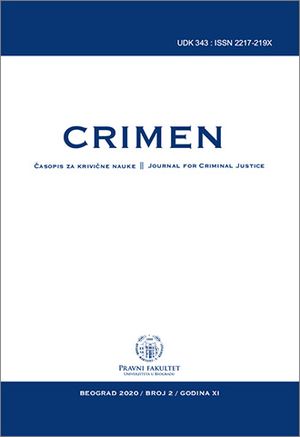DOKAZNI ZNAČAJ FOTOGRAFIJA, AUDIO I VIDEO SNIMAKA KOJI NISU PROIZAŠLI IZ DOKAZNIH RADNJI
THE PROBATIVE VALUE OF PHOTOS, AUDIO AND VIDEO RECORDINGS THAT DID NOT RESULT FROM EVIDENTIAL ACTIONS
Author(s): Natalija M. ŽivkovićSubject(s): Law, Constitution, Jurisprudence, Constitutional Law, Commercial Law, Court case
Published by: Правни факултет Универзитета у Београду
Keywords: photographs; recordings; citizens; probative value; right to privacy;
Summary/Abstract: Given that citizens are not authorized to conduct evidentiary actions, and it is indisputable that the citizens today, with the development of technology, can capture and photograph events around them at almost any time, the object of this paper is to determine the probative value of photographs and recordings made by citizens. The question of the probative value of the afore mentioned photographs and recordings is raised primarily in connection with the violation of the right to privacy of the persons who were recorded. The CPC/2011 only lays down certain evidentiary prohibitions in one general way. Therefore, the author analyzes relevant legal provisions aimed at protecting the right to privacy of citizens. First, photographs and recordings made by citizens must not result from a crime. The relevant offenses are unauthorized wiretapping and recording and unauthorized photographing. In support of the fact that photographs and recordings of someone committing a crime constitute admissible evidence, it is also reflected in the provision of the Public Information and Media Act which establishes derogations from the right to privacy if the person has attracted public attention through his public statements or behavior in private, family or professional life and thus gave rise to the publication of information, or records. Second, in the case of photographs and recordings taken on security cameras installed to protect the security of people and property, which monitor public areas or facilities or premises that are privately owned and if the cameras are installed in accordance with the Private Security Act, we consider such recordings and photographs should be admissible evidence. Finally, we consider that the evidence obtained illegally by the court should be distinguished from the evidence obtained illegally by the citizens. This means that a lesser criterion should be applied especially if the citizen violated someone’s right to privacy by the necessity of providing evidence, and especially if he/she was damaged by criminal acts.
Journal: CRIMEN - časopis za krivične nauke
- Issue Year: XI/2020
- Issue No: 2
- Page Range: 180-193
- Page Count: 14
- Language: Serbian

